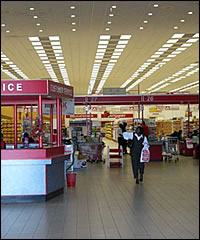Nairobi: Awake 24-7

 |
| Inside one of the leading supermarkets at night |
Global Food Crisis
With a looming global food crisis, we should brace ourselves for massive food price hikes and shortages as demand for cereals is increasingly outweighing supply as governments in producer countries curb exports to prevent protests. But the picture is looking gloomy due to shortages on the international market. The price of rice on the international market - the staple food for about 3-billion people who make up nearly half the world’s population - last month hit a 19-year high, wheat prices rose to a 28-year high and almost twice the average price of the past 25 years. Governments across the continent are becoming anxious about public anger as the rise in international food prices pose significant threats to Africa’s growth, peace and security with already 40 people killed during price riots in Cameroon in February. There also have been violent demonstrations in Cote d'Ivoire and Mauritania and strikes in Senegal and Burkina Faso, while Egyptians are also planning on taking to the streets over food price hikes in the past week.
NEPAD Meeting in Dakar
The New Partnership for Africa’s Development (NEPAD) implementation committee meets in Dakar, Senegal this week to put the African Union initiative into the ‘right path’, according to an official source. President Abdoulaye Wade of Senegal, South Africa’s Thabo Mbeki, Nigeria’s Umaru Mussa Yar’Adua and the Prime minister of Ethiopia, Meles Zenawi will meet in the Senegalese capital to boost NEPAD. The Dakar meeting was decided by the African Union in June, last year, during the Heads of State’s summit in Accra, Ghana. NEPAD was launched in 2001 to reduce the development gap between Africa and the rest of the world, but it is confronted with many implementation difficulties.
E-banking Opportunity in Sierra Leone
Online banking is slowly taking ground in Sierra Leone. Though some banks are operating with the new innovation, consumers have not started benefiting en mass from the services. With high-end internet users of about 60,000 and low end users of 30,000 in relevance to the approximately 250,000 active bank account holders in the country, online banking has an opportunity to succeed in Sierra Leone if solid implementation structures are put in place. Online banking uses today’s computer technology to give customers the option of bypassing the time-consuming, paper-based aspects of traditional banking in order to manage their finances more quickly and efficiently. It saves time and the frustration some customers encounter when they have tight schedules.
Côte d’Ivoire Elections in November
The United Nations peacekeeping mission in Côte d’Ivoire (UNOCI) has welcomed the announcement of the country’s much delayed presidential elections will now be held on 30 November this year. The publication of the poll date marks one of the greatest achievements in the Ivorian peace process since the outbreak of the crisis more than four years ago. Presidential polls were to be held as far back as 2005, but have been delayed several times since then. Côte d’Ivoire became divided in 2002 between the Government-controlled south and the rebel Forces Nouvelles-held north, however, last year’s Ouagadougou Peace Agreement paved the way for an end to the conflict and included a provision calling for free and fair elections to be held.
